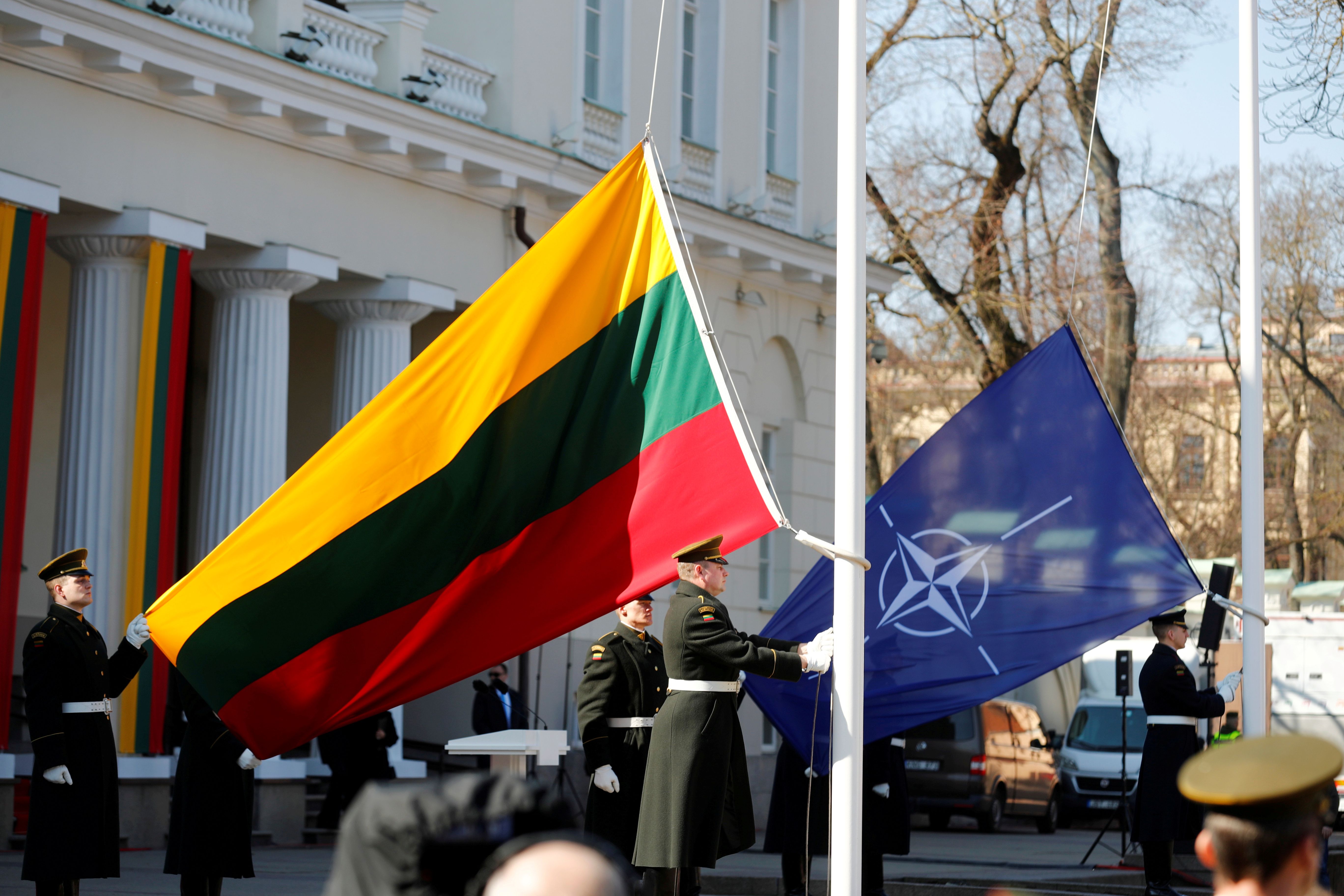Lithuania’s Plans to Strengthen Security Policy

The Key Role of the U.S.
Due to Russia’s policy, the government of Ingrida Šimonytė invariably defines the U.S. as the most important country for the security of Lithuania and the entire Baltic Sea region and for NATO’s Eastern Flank. This is evidenced by, among others, the adoption by the Lithuanian parliament in January this year of a resolution on strengthening the strategic partnership with the United States. Therefore, for Lithuania, as well as for Latvia and Estonia, the declarations of the new American administration on further support for the Baltic states are important and were confirmed by U.S. Secretary of State Antony Blinken during his visit to Brussels in March and President Joe Biden during the June NATO summit.
Lithuania is particularly interested in the permanent presence of U.S. troops on its territory. Currently, there is a contingent of 500 American soldiers as part of a rotating battle group. At the same time, Lithuania is buying weapons systems and equipment from the U.S. (e.g., Javelin anti-tank missiles, Black Hawk multi-purpose helicopters, and armoured vehicles).
Main Directions
Lithuania recognises the increasing complexity of its security environment, and consequently the need to intensify and further diversify its activities in cooperation with individual partners. The Lithuanian government declares its willingness to become more involved in EU defence initiatives, among others. Lithuania is the main country for the development of EU Cyber Rapid Response Teams under PESCO. At the same time, Lithuania does not support the concept of EU strategic autonomy if defined as an alternative to NATO. Lithuania’s goal instead is to increase military mobility within the EU and ensure Member States’ readiness for coordinated cooperation with NATO and its allies. Despite this, Lithuania is interested in strengthening the EU’s defence potential, which makes France an increasingly important partner for it, particularly in supporting the development of independent EU defence structures. In view of that country’s continued involvement on the Eastern Flank (e.g., Air Policing), Lithuania declared it would intensify its participation in foreign missions supporting French activities outside the EU, for example, in Mali.
Among the European partners, cooperation with Germany remains the most important for Lithuania. The German contingent is the most numerous among the 1,200 soldiers of the NATO multinational battlegroup (eFP), stationed in Lithuania since 2017. Moreover, last year Lithuania and Germany signed an agreement on the terms of the temporary stay of German armed forces deployed for training and exercises. Lithuania also buys military equipment from Germany, including Unimog trucks, Vilkas infantry fighting vehicles, PzH 2000 self-propelled howitzers, and M577 armoured personnel carriers.
Lithuania will strive for further cooperation with the UK, which results from its defence potential—the largest in Europe besides France—and similar strong attachment to the policy of deterrence of Russia. This cooperation applies particularly to the Baltic Sea region where the British operate as part of Joint Expeditionary Forces (JEF).
Strengthening Lithuania’s Defence Potential
The conservative government decided to review its Security Strategy and to base it on closer civil-military cooperation, among other changes. This direction is supposed to strengthen the resilience and readiness of the state for a coordinated response to contemporary threats. This goal is to be supported by the increased financing of defence in recent years, which by 2030 is expected to reach up to 2.5% of GDP. This level also makes Lithuania more credible as a NATO member state, along with ensuring the appropriate conditions for the conduct of a collective defence mission on Lithuanian territory. This goal is central to plans to further improve logistics and military infrastructure. Lithuania intends to modernise its military, including by expanding troop levels (e.g., in 2022, a decision is to be made about returning to universal conscription). By 2024, the size of the reserve is to be 30,000, up from the current 19,000—and to 60,000 by 2030.
The development of air defence is key for Lithuania’s defence. In the years 2021-2023, the country plans to install NASAMS medium-range terrestrial systems. By 2024, it aims to consolidate its activities in the field of cybersecurity, especially in the face of the growing threat of cyberattacks (in 2020, it recorded an increase in attacks of 25% compared to 2019). For this purpose and others, the Lithuanian parliament prepared amendments to the act on electronic communications to ensure that only devices and technologies from acceptable manufacturers are used in the development of 5G infrastructure. In practice, along with Russian solutions, this will also limit Chinese investment opportunities.
Potential for Cooperation with Poland
Lithuania is also intensifying cooperation with Poland, treating it as an element of increasing its security. Both countries gave the joint activities a more formal character, establishing, for example, a Presidential Council and the intergovernmental Council of National Defence, the second session of which took place in May this year. In February 2019, during a visit to Warsaw by the then president of Lithuania, Dalia Grybauskaitė, a declaration was signed to strengthen the partnership in the field of security. Defence ministers also concluded an agreement on the exchange of information on airspace monitoring and signed a letter of intent on the affiliation of the Polish and Lithuanian brigades within NATO (the 15th Mechanised Brigade in Giżycko and the Lithuanian Iron Wolf mechanised brigade). In assigning units to the division command in Elbląg, the cooperation was also extended to the field of military exercises and the creation of joint defence plans. This has had an impact on the potential for increased effectiveness of cooperation during joint missions, including by adjusting required procedures. This translates into close cooperation between the Polish and Lithuanian military staffs.
Both countries want to strengthen security in the Baltic Sea region (e.g., within the framework of the Northern Group, as well as the Baltops and Northern Coasts manoeuvres, or the SUCBAS initiative). They also want to develop naval defence forces, which is a goal associated with increasing the ability to monitor the waters of the Baltic Sea. At the same time, plans to equip the army with modern technologies, including new radar systems and drones, require coordinated actions in the field of cybersecurity and protection of critical infrastructure. This applies in particular to electricity grids and connections, the more so that Lithuania and the other Baltic states will be synchronised with the European grid through Poland. Lithuania, for security reasons and others, also wants to limit the inflow of energy from the Belarusian nuclear power plant in Astravyets.
Conclusions and Perspectives
The Lithuanian authorities are striving to diversify and intensify cooperation in the field of security. This applies to both the bilateral dimension, for example, with Germany or France, and the EU dimension under PESCO, as well as the strengthening of transatlantic cooperation through NATO. This does not affect the key position of the U.S., whose role remains is confirmed by the Lithuanian efforts to maintain the presence of American troops on the state’s territory. Moreover, the Lithuanians and the Americans plan not only to further arm Lithuania’s military but also to train it. The implementation of the ambitious goals may, however, be difficult due to the effects of the pandemic, which has limited Lithuania’s financial capabilities and may determine, for example, the extent of the plans to modernise the army.
Poland plays an important role in increasing regional security and is a strategic partner for Lithuania. The key area of their cooperation is strengthening NATO’s Eastern Flank, especially in terms of increasing the mobility and interoperability of troops, or the development of air defence. This is to be supported by further tightening of bilateral cooperation, for example, in the field of joint defence plans for both countries and exercises and training. This also extends to territorial defence structures, due to the extensive experience of the Lithuanian Volunteer National Defence Forces (KASP), as well as the intensification of activities in the civil and military dimensions. Given the events and circumstances in the region, initiatives, including bilateral ones, supporting pro-democratic changes in Belarus, the fight against disinformation and propaganda, and Ukraine (militarily and in training as part of the LITPOLUKRBRIG, a multinational, tripartite brigade stationed in Lublin) are important.


